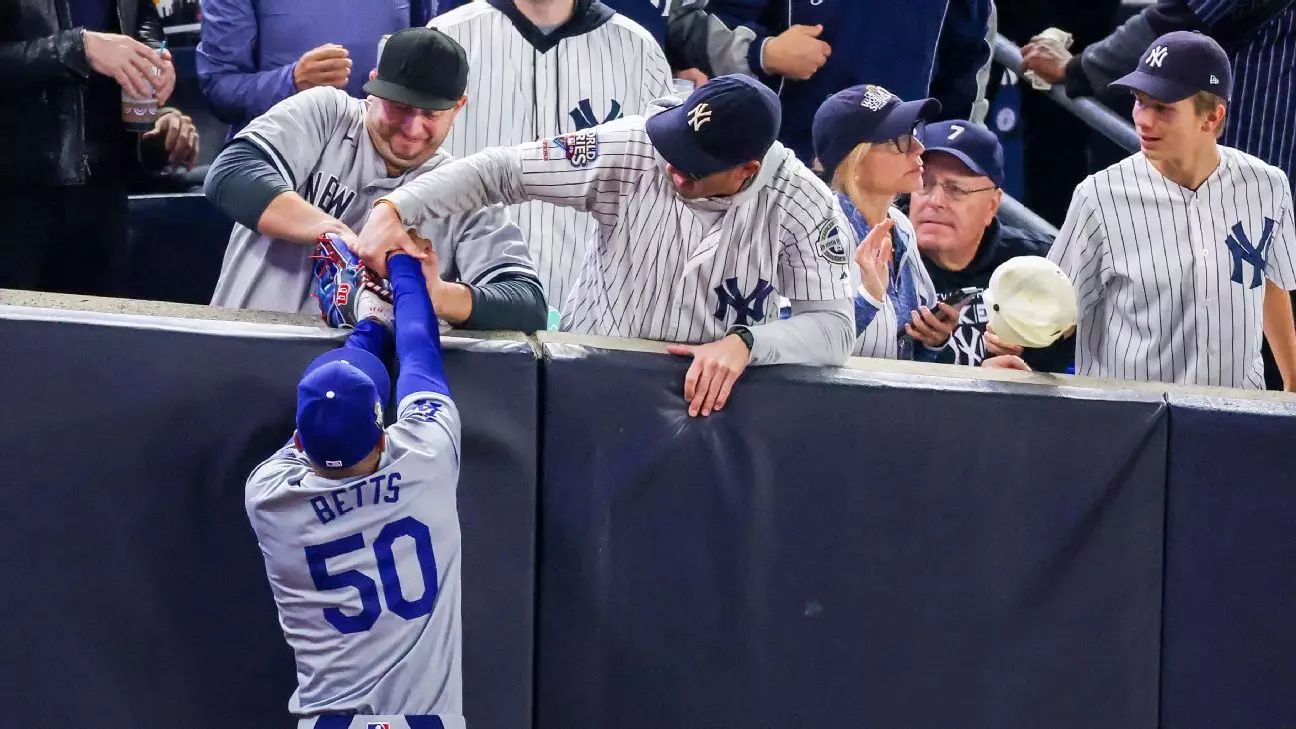In a climax of high tension and excitement, Game 4 of the World Series at Yankee Stadium turned quite unconventional when a fan’s attempt to catch a foul ball escalated into an unexpected confrontation with Los Angeles Dodgers right fielder Mookie Betts. The incident quickly became a talking point, not just for the immediate drama it caused during the game but for the implications it had concerning fan behavior and the integrity of the sport itself. As sports fans, we find ourselves questioning where the line is drawn between enthusiasm and unacceptable interference.
During the first inning, Gleyber Torres hit a pop-up that appeared to be an easy catch for Betts, who leaped at the wall to secure the ball. However, the situation took a sharp turn as Austin Capobianco, a 38-year-old season-ticket holder for the Yankees, reached over and forcibly pulled the ball from Betts’s glove. His friend, John Peter, further aggravated the situation by grabbing Betts’ arm. The action led to the immediate decision of the right-field umpire to declare fan interference, ruling the batter out.
This dramatic episode plunged the game into chaos, amplifying the emotions both on the field and in the stands. As Betts expressed his irritation, the astounding nature of Capobianco’s actions left spectators shocked and intrigued. Such interference is not only against the rules but also poses serious ethical questions about how far some fans are willing to go to display allegiance to their team.
Following the event, Capobianco openly acknowledged his knowledge of the wrongness of his actions but justified it as a passion-driven decision to support his team. Speaking to ESPN, he stated, “We’re willing to do this,” emphasizing the camaraderie he shares with Peter regarding fan interactions at games. This mindset raises troubling questions about the nature of fandom. At what point does enthusiastic support cross into egregious behavior? Is it acceptable for fans to prioritize their team’s success, to the detriment of the players’ integrity or safety?
Betts, for his part, took a more measured approach post-game, suggesting that the incident was inconsequential in the broader context of the match. “It’s irrelevant,” he stated, downplaying the fan’s interference as he reflected on the game’s outcome, which resulted in an 11-4 loss for the Dodgers. Betts’ ability to maintain composure speaks volumes about his professionalism, highlighting the disparities between players’ aspirations versus fans’ fervent wishes.
The Aftermath and Future Implications
After the incident, Capobianco and Peter were escorted from the stadium, though they received an assurance that they could return for Game 5. Their quick ejection, however, is more than simply a disciplinary action; it is a necessary reminder that fan behavior has consequences. The incident has prompted the sports community to consider how to effectively manage such unruly actions to maintain the sanctity of the game.
Furthermore, Torres, who was adversely affected by fan interference twice in the same World Series, had to deal with interruptions that could skew the fairness of play. His earlier at-bat in Game 1, where a fan caught his fly ball, resulted in a double, suggesting that the consequences of fan actions can ripple beyond a single moment—altering the course of a player’s performance and possibly the series itself.
As this World Series incident unfolds, it provides an opportunity for deeper discussions about fan conduct and involvement in professional sports. Are we witnessing the emergence of a culture where fan behavior increasingly blurs the lines of sportsmanship? This incident serves as a reminder that, regardless of loyalty to a team, the integrity of the sport must prevail. It encourages fans to engage respectfully, recognizing that their actions can have profound consequences not just for the game, but for the athletes who strive to perform their best.
While the excitement of a World Series game can bring fans to the edge of their seats, it should also promote a sense of decorum, ensuring that everyone involved—players and fans alike—can enjoy the game for what it is: a test of skill and a showcase of sportsmanship. The lessons revealed in this incident may lead to necessary conversations about how passion can coexist with respect for the game, ensuring that future sporting events are remembered for their brilliance rather than controversial distractions.

